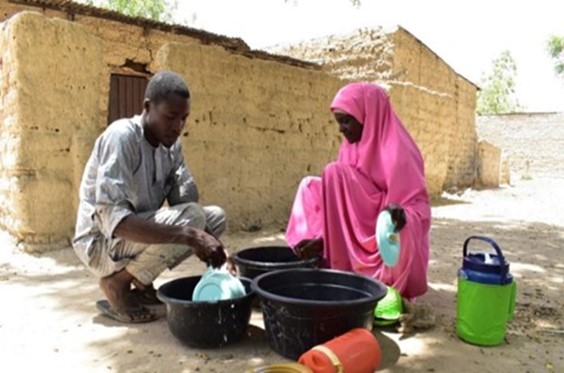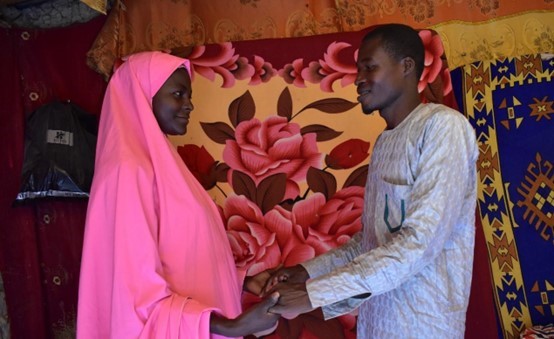Redefining Fatherhood: Adamu’s Story
Published on August 19, 2024
By Titilayo Olukare, SBCC Officer, RUWOID; and Samaila Yusuf, Senior Gender and SBCC Advisor, MOMENTUM Country and Global Leadership
Growing up, Adamu listened and watched older Nigerian men navigate life and, particularly, fatherhood. From what he saw, he believed fathers were meant to enforce rules in a household. And, in fact, men who made decisions jointly with their wives were considered weak.
“I thought the only way to exercise my authority as a man over my family was by using power over my wife. I didn’t listen to her. I didn’t allow her to make suggestions. I ended up hurting her feelings and almost destroyed my family,” says Adamu, a 40-year-old farmer who lives in the Kalmalo community of Illela Local Government Area, Sokoto state in Nigeria.
After some convincing by his neighbors, Adamu began attending sessions in a program called SASA! Together, a community mobilization intervention that seeks to address the drivers of gender-based violence against women and girls following four stages of change—start (pre-contemplation), awareness (contemplation), support (preparation), and action. MOMENTUM Country and Global Leadership supported local partners to maintain the four essential elements of SASA! Together during the adaptation process and effectively use it to prevent violence against women in nine communities across Nigeria’s Ebonyi and Sokoto states.
Adamu attended SASA! sessions with other community members where they had discussions about decision-making and how power can be the root cause of violence against women.
The group discussions allowed him to think about his life and family. “I was very uncomfortable knowing that I was hurting my family,” says Adamu, the father of three.
Once a month, Adamu and his wife joined other couples in an intense discussion session where topics such as equality, violence, and financial empowerment were addressed. His wife was referred to an economic empowerment initiative in the community tailored for women to help her access capital and complement her husband’s income. Through this program, she gained a sense of confidence and self-worth and increased her influence in joint household decision-making.
“My actions had an impact on my wife and children – our relationship was cold and my family felt I did not care,” he admits. “I heard about the SASA! sessions in my village. After attending, I realized the results of my actions and turned a new leaf.”
“We have seen that participation in community groups and financial access increases women’s power. Also, involvement in resources allows a woman to participate in decision-making regarding the family’s well-being,” says Samaila Yusuf, Gender Advisor with MOMENTUM.

Adamu’s wife, Lami, also attended a separate session tailored for women. All sessions were led by community facilitators from a local organization and MOMENTUM partner, Rural Women and Youth Development (RUWOYD). These facilitators supervised sessions with a particular emphasis on fostering community engagement, encouraging active participation from all community members, and prompting participants to contribute, reflect, and inquire, thereby enhancing dialogue and knowledge exchange. As a result of the SASA! Together sessions in Ebonyi and Sokoto states, community members are better prepared to deal with sensitive issues such as power inequalities while breaking the silence surrounding topics like sexual consent and intimate partner violence that, for too long, had been considered taboo to discuss in public.
Supporting this community-based program, and the local organizations that led it, was a key strategy in MOMENTUM’s effort to enable communities to transform gender and social norms through the prevention and mitigation of violence against women and girls while addressing the drivers of early and forced marriage. The project also partnered with Nigeria’s Ministry of Health and Social Welfare to co-create GBV prevention strategies and with the Ministry of Women Affairs to improve governance and coordination of GBV activities at national and sub-national levels.
From November 2022 to March 2024, 4,573 SASA! Together sessions were held across Sokoto and Ebonyi States, reaching 39,247 community members with thought-provoking questions to help them reflect on their own relationships and the qualities of respecting, valuing and caring for each other as either couples or partners. Of these community members, 54% (21,118) were men and 46% (18,129) were women.
 Lami, Adamu’s wife, has seen changes in her husband.
Lami, Adamu’s wife, has seen changes in her husband.
“In addition to being caring and considering my input, my husband has demonstrated genuine concern for both my well-being and the health of our three children,” says Lami. “He ensures that we are well-fed and now actively inquires about our needs—a clear change from before.”
This blog was written with contributions from Chukwuemeka Stanley Okereafor, Knowledge Management Advisor, MOMENTUM Country and Global Leadership Nigeria; Chioma Oduenyi, Project Director, MOMENTUM Country and Global Leadership Nigeria; and Joan Nduta, Communications Manager, Jhpiego

